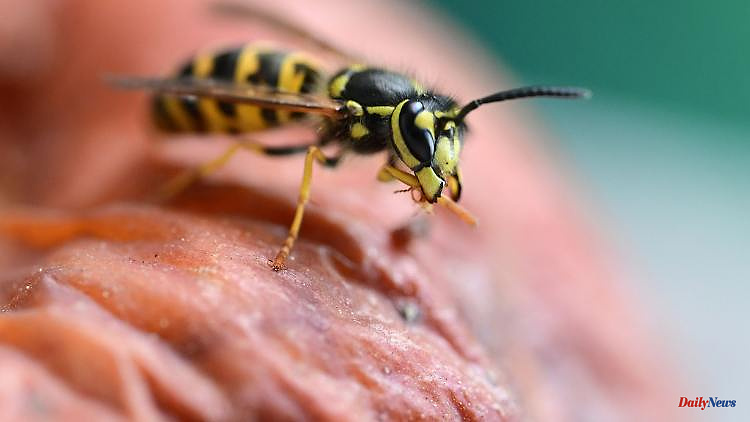The weather is particularly good for the wasps this year. They are already sitting en masse at the bakery counter, buzzing about the food on the balcony. And that will probably last a little longer. They are much more than buzzing nuisances.
Stuttgart (dpa / lsw) - After a strong start to the wasp year, the number of yellow-black insects is likely to continue to rise with the persistently high temperatures in Baden-Württemberg. "Wasps continue to develop their colonies, which only reaches its peak in September," says Manfred Verhaagh, entomologist and head of entomology at the Karlsruhe Natural History Museum. "Then their number is highest." The wasps are also benefiting from the persistently strong summer this year: "These are currently really good conditions for the reproduction of the wasps," says Claudia Wild from the German Nature Conservation Union (Nabu).
But Wild isn't worried. There are significantly more insects than usual, but the past year was also very bad for wasps. "It's only annoying for us. In nature, on the other hand, these insects fulfill an important task," the Nabu spokeswoman pleads for understanding. Among other things, they captured flies and mosquitoes, aphids, caterpillars and other insects in order to provide their brood with animal protein. But people like to fight these insects and pests with chemicals.
"Wasps are the health police," says Martin Klatt, species protection officer at Nabu Baden-Württemberg. They perform a valuable service because they carry away dead insects in small portions. According to the Bund für Umwelt und Naturschutz (BUND), a small wasp colony consumes up to 3000 flies, mosquitoes, caterpillars, moths, spiders and other small animals per day. In addition, they fed on plant juices and fruit, visited many flowers and contributed to their pollination and thus to a rich fruit harvest.
According to the animal rights activists, the warm and dry spring enabled many young queens to spread out with their nests, and in contrast to the previous year there were no frequent heavy rains or frosts. "This is of course perfect - not only for wasps, but also for other insects."
New queens and males will also be produced in the nests in the coming weeks - so the colony needs a lot of food. The wasps have to pick them up at the garden party - whether it's cake, jam or cola. People also noticed the sometimes annoying animals so much because the variety of food decreased due to the drought in August, says Wild. The animals swarmed out and helped themselves to the people instead of in the wild. "There's just a lot less nectar, so the rush for the lemonade is naturally greater," says Wild.
Exterminator James Haffenden can document the good wasp year with numbers. A look at his sales is enough. "We have many more operations than in a normal year," says the pest controller from Edingen-Neckarhausen (Rhein-Neckar district). The spring was almost perfect for building the nests of the stinging pests - above all the most common German wasp, the common wasp and the hornet.
What helps? Certainly no wagging or blowing, because wasps use smells as a guide and fly back and forth in the wind to find a trail. According to Nabu, the carbon dioxide in the breathing air is also an alarm signal for the animals and puts them in an attacking position. They sting whenever they feel threatened. "So avoid violent movements, don't hit the animals," advises the association.
Beekeepers recommend covering food and putting away leftovers, and essential oils such as cloves or lavender can also help. "It can also be useful to distract wasps with a bottle with sweet contents that is standing on the side, so set up their own feeding place and distract them," says Nabu. Expert Klatt recommends spraying wasps with atomized water. Then the wasp flies back to its nest because it thinks it's raining.
Wasps and their nests are protected in Germany by the Federal Nature Conservation Act and may not be destroyed. Removal is only possible in justified emergencies. Hornets are even considered to be particularly protected.












